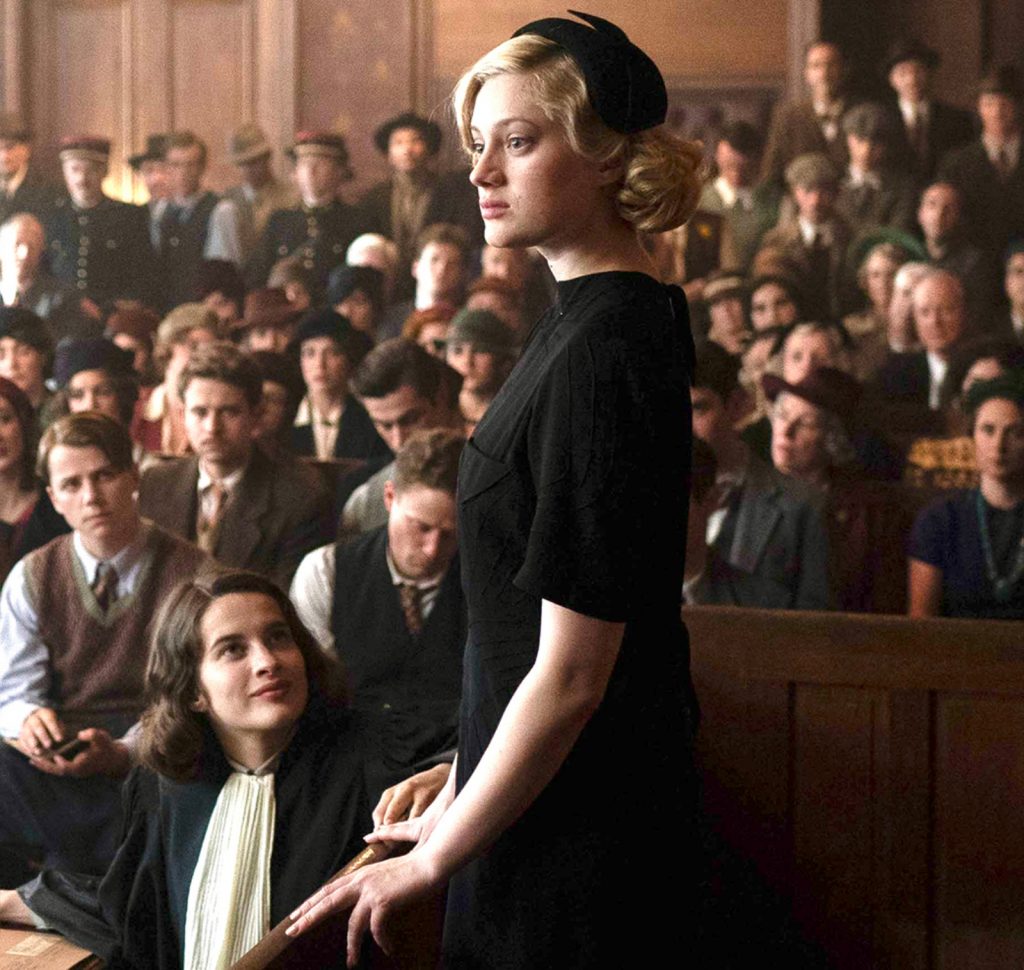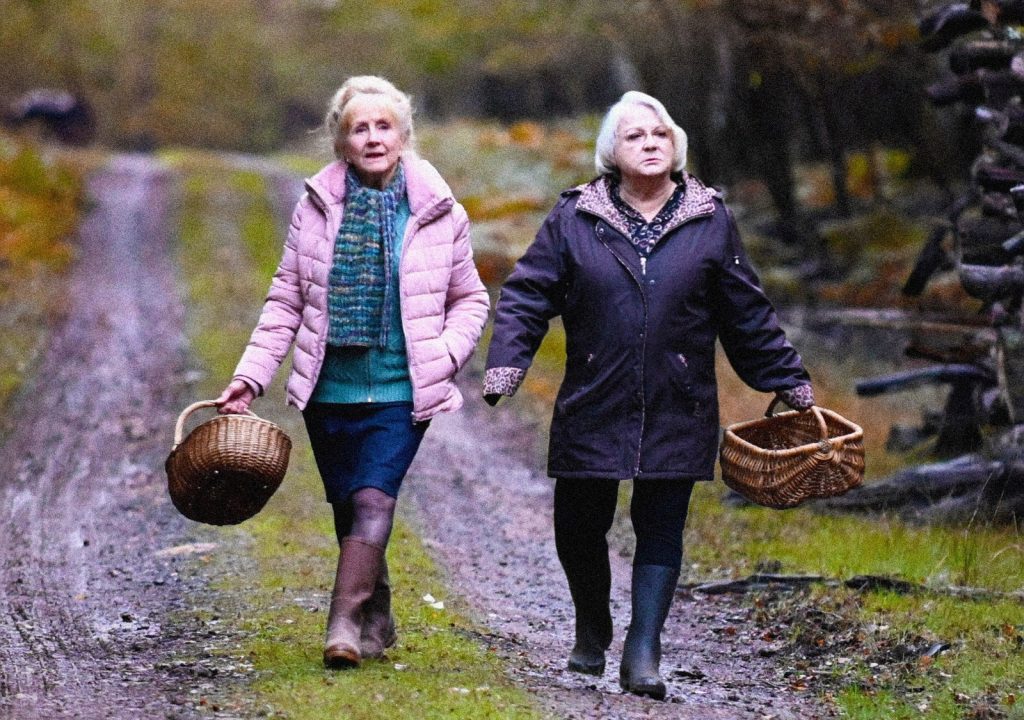“All my women have big balls,” laughs François Ozon. It’s an uncharacteristically brash statement from this most elegant and stylish of French film-makers.
But it is true. Over the years, he has become known as a consummate director of women in female-dominated comedies and dramas.
“I should clarify that,” he adds quickly. “I like to show clever women who make their own way to get where and what they want. I was always fed up of women characters being in secondary roles so I aimed to put them at the centre of the story. You could say that was a big aim of my films, to show that women can be as powerful, as complex and, yes, just as monstrous as any male character.”
Early on in his career, he put eight women together in one big house in the camp, musical murder mystery 8 femmes (2002). It starred some of the most recognisable leading ladies from generations of French film, including Isabelle Huppert, Danielle Darieux, Fanny Ardant, Catherine Deneuve, Emmanuelle Béart and newer faces such as Virginie Ledoyen and Ludivine Sagnier. It became a big hit and remains a perennial French favourite, particularly around Christmas time.
Ozon is credited with reviving the screen career of Charlotte Rampling in dramas such as Under the Sand and Swimming Pool, and has given roles to a roster of stars that includes Kristin Scott Thomas, Sophie Marceau, Marine Vacth, Germany’s Paula Beer, Britain’s Romola Garai and actress-turned- director Valeria Bruni Tedeschi.
The latest to join the Ozon club des femmes are two of the new generation’s rising stars, Nadia Tereszkiewicz and Rebecca Marder, who take joint lead in his latest film to appear in UK cinemas, a deceptively satirical 1930s-set comedy called The Crime Is Mine (simply known as Mon Crime in France).
Tereszkiewicz and Marder play friends and flatmates Madeleine and Pauline, living in a dingy attic room in the bustling, metropolitan Paris of the early 1930s. Madeleine is a struggling actress while Pauline is starting out as a lawyer.
“I had an image of Marilyn Monroe and Katherine Hepburn in my mind and I think I got the perfect pair,” says Ozon proudly when we meet over Zoom. “But most importantly, I needed actresses who could handle the fast dialogue and all the styles and comic rhythms of the text.
“Rebecca was a part of the Comedie Française [a sort of RSC for France] for many years so I knew she could do it, and Nadia is much newer to cinema but she has a very period look, a naive innocence where you think, like Marilyn, she’s a “ravissante idiote” but really she’s much smarter than that.” Ravissante Idiote is the title of a 60s French-Italian spy comedy starring Brigitte Bardot, so the expression is now the equivalent of our ‘“dumb blonde”.
When, a few days later, I put that to Tereszckiewicz herself, she fortunately receives it as a compliment. “I will take that!” she giggles, in excellent English.
“I’ve been a fan of Ozon films since I was a child, so it was a dream to be cast as one of his ‘femmes’. I know how much he respects women and I always thought this film was very political underneath its comedy, the way it defends the feminine condition, so if I can be comic and still get a serious point like that across, then I have succeeded.”
In The Crime Is Mine, Nadia’s struggling actress is accused of murdering a powerful film producer who has made unwanted sexual advances on her in return for a small role in a film, and a role as his mistress. Naturally, she enlists Marder’s Pauline to be her lawyer and the subsequent murder trial scandalises 1930s Paris and, ironically, makes both women stars of their own fields.
“I just wanted to make sure my character feels relevant,” says Nadia. “She gets a voice, defends her position and is heard, so to be compared to a role that Bardot or Monroe would do, that’s just fabulous because that is exactly what they did in their careers, defining themselves outside of what men saw in them.”


Like a Bardot flashback, she’s talking to me from the set of an Italian movie, a western called Testa o Croce (Heads or Tails), where she’s been taking horse riding lessons and speaking Italian. “I’m practically the only girl in the whole thing and I’m playing it like a mix of Claudia Cardinale and Calamity Jane,” she laughs.
Last year, Nadia, a former ballet dancer, won the César for Most Promising Actress for her breakthrough role in Forever Young, a film directed by Ozon alumna Valeria Bruni Tedeschi. Her increasing profile powered The Crime Is Mine to an impressive box office performance in France last year, although there are several other more established star names in the ensemble, too, including Isabelle Huppert in the flamboyantly ripe role of Odette Chaumette, a silent movie star sidelined by the talkies.
“Ah Isabelle, how do you say it,” says Ozon. “Yes, ‘she steals the show’.” And Huppert really does, although the young stars have nothing but awe for their illustrious colleague who bursts into the action over halfway through the film.
Marder says they didn’t have time to be intimidated. “She comes on to the set and takes control of everything but not in a bossy way. She just dictates the tone by being so passionate and engaged, it’s like the whole set raises their game. You just get the sense she’s excited to be working on that day, in that moment.”
Nadia says one night after filming she was off to see a friend performing in a ballet and Huppert asked if she could come along. “She told me something I will never forget: that she has never worked a day in her life. She’s just so curious about everything and everyone. She’ll shoot a movie, do some theatre, pop over to do a scene in another movie, go to the opera and she’s this immense and inspiring actress but very good at being normal. I loved being around her.”
Interestingly, the film makes reference to the true crime case of Violette Nozière, a case that shocked 1930s Paris when, as an 18-year-old, she was accused of attempting to murder her parents and in turn, in the dock, accused her father of incest. When Claude Chabrol made a film of it, it was Huppert who won Best Actress at Cannes in 1978 for the part – the first of many famous collaborations between them.
“There were many current affairs stories about women which shocked the press in the 1930s,” says Ozon. “There was also the case of the Papin sisters, the story which inspired The Maids by Jean Genet. It was a very conservative culture. Women didn’t have the vote, or even the power to write a cheque without their husband’s approval. So women were finding ways to exert some power, but when they saw that women could commit crimes and murders, that was a big moral panic for the establishment.”
But Mon Crime plays it for comedy, all the while clearly reflecting on the #MeToo elements of today. “We lived through perhaps a similar moment,” reckons Ozon. “And there had definitely been a reset in the French industry – more female directors and the revelations of abuse and bullying and harassment. But,” he adds. “It’s not just the men – Catherine Breillat has been accused, and Catherine Corsini, so it’s not about men and women, it’s about power.”



Marder agrees. “I would have loved being young in 1930 Paris for the big cinemas and brasseries, it was an exciting time, but for a woman, things are much better now. I’ve been acting since I was 10 years old and I can say I’ve been lucky never to have any #MeToo incidents – in fact the only times I’ve felt uncomfortable or humiliated on set has been with a female director.”
But has she heard stories? Given the subject of the film, did she and Nadia and Isabelle talk about these things? “You’d have to be living in a cave not to hear stories,” she admits. “And to be honest all we said was that it will be a relief when it’s not a story any more and we can just get back to talking about cinema – but as we see in this film, you need a lot of distance to laugh about it. If you did a #MeToo story nowadays, it certainly would not be a comedy.”
As for Nadia, she crackles with relief that her strict days of classical dance are behind her. “I don’t miss it at all,” she says. I’m a little surprised, but in terms of strict control and physical strain – she won’t go as far as to call it abuse – there’s a freedom about the way she’s now attacking her acting career.
“I had a strange childhood,” she says, “although you don’t know it at the time, but I was travelling, dancing, studying in a dance school and that was between the ages of four and 18. It’s a lifetime, and I was good, but I wasn’t going to be a prima ballerina and yes, I found the demands violent and tough. So now, in cinema as an actress, I can be all the women I want to be. All those fragilities and vulnerabilities I had to hide as a dancer, I can let them out and it has been so liberating. Cinema accepts all kinds of femininity, and that has really allowed me to feel like I’m living.”
As for Ozon, well, prolific as ever, he’s got a new film, a new hit, just out in France, Quand vient l’automne, which has been given the dreadful title in English of When Fall Is Coming for its UK debut at this week’s London Film Festival. So there will be two new Ozon movies for British audiences.
The newest film – a plangent drama about ageing and family trauma, set in the Burgundy countryside – also features some returning Ozon women, in the form of Josiane Balasko and Hélène Vincent as best friends in a rural village, but most recognisably in the form of Ludivine Sagnier, who plays a daughter returning to her mother’s home, greedily sniffing out some schemes to avoid inheritance tax.
“I left Ludivine by a swimming pool in a bikini 21 years ago, and so it’s been very emotional to work with her again. She’s now a very grown-up woman in her 40s, a different person. I hope we both are,” says Ozon.
In a recent interview – the film won Best Screenplay and Best Actor at last month’s San Sebastián Film Festival – Sagnier also reflected on her long association with Ozon, for whom she starred in his first Fassbender homage Water Drops on Burning Rocks, before the big hits of 8 femmes and Swimming Pool.
“We enjoyed great success early on,” she said. “Those films made my life and my career, and now here we are, and I’m in my 40s, so it’s a joy to find him again, still making these films that allow me to play these difficult, dodgy characters, ones that aren’t instantly likeable, shall we say.”
Although vastly different in feel to the comic caper of The Crime Is Mine, the familiar currents of Ozon’s film-making moulder under the surface of the leaves and compost, just as they lurked under the shimmering Swimming Pool, or “under the sand”. “It’s amazing to be in another film about female relationships, and such a rich story where François doesn’t judge the women, but lets the audience decide, or our performances decide,” says Sagnier.
Ozon remains one of the rare foreign film-maker names for whom UK audiences regularly turn up, even after 22 films. Like the actresses he allows to shine in his movies, we are spoiled for choice but always rewarded.
The Crime Is Mine is in UK cinemas from October 18; When Fall Is Coming screens at the BFI London Film Festival on October 18 and 19.




